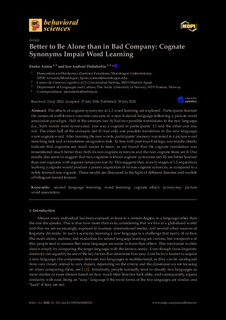| dc.rights.license | Attribution 4.0 International | * |
| dc.contributor.author | Antón, Eneko | |
| dc.contributor.other | Duñabeitia, Jon Andoni | |
| dc.date.accessioned | 2020-09-25T11:11:53Z | |
| dc.date.available | 2020-09-25T11:11:53Z | |
| dc.date.issued | 2020-07-29 | |
| dc.identifier.issn | 2076-328X | en |
| dc.identifier.other | https://katalogoa.mondragon.edu/janium-bin/janium_login_opac.pl?find&ficha_no=159939 | en |
| dc.identifier.uri | https://hdl.handle.net/20.500.11984/1836 | |
| dc.description.abstract | The effects of cognate synonymy in L2 word learning are explored. Participants learned
the names of well-known concrete concepts in a new fictional language following a picture-word
association paradigm. Half of the concepts (set A) had two possible translations in the new language
(i.e., both words were synonyms): one was a cognate in participants’ L1 and the other one was
not. The other half of the concepts (set B) had only one possible translation in the new language,
a non-cognate word. After learning the new words, participants’ memory was tested in a picture-word
matching task and a translation recognition task. In line with previous findings, our results clearly
indicate that cognates are much easier to learn, as we found that the cognate translation was
remembered much better than both its non-cognate synonym and the non-cognate from set B. Our
results also seem to suggest that non-cognates without cognate synonyms (set B) are better learned
than non-cognates with cognate synonyms (set A). This suggests that, at early stages of L2 acquisition,
learning a cognate would produce a poorer acquisition of its non-cognate synonym, as compared to a
solely learned non-cognate. These results are discussed in the light of different theories and models
of bilingual mental lexicon. | en |
| dc.description.sponsorship | Gobierno de España | es |
| dc.description.sponsorship | Comunidad de Madrid | es |
| dc.language.iso | eng | en |
| dc.publisher | MDPI | en |
| dc.rights | © 2020 by the authors. Licensee MDPI, Basel, Switzerland | en |
| dc.rights.uri | http://creativecommons.org/licenses/by/4.0/ | * |
| dc.subject | Second language learning | en |
| dc.subject | Word learning | en |
| dc.subject | Cognate effect | en |
| dc.subject | Synonymy | en |
| dc.subject | Picture word association | en |
| dc.title | Better to Be Alone than in Bad Company: Cognate Synonyms Impair Word Learning | en |
| dc.type | http://purl.org/coar/resource_type/c_6501 | |
| dcterms.accessRights | http://purl.org/coar/access_right/c_abf2 | en |
| dcterms.source | Behavioral Sciences | en |
| local.contributor.group | Berrikuntza eta esku-hartzea gizarte kulturanitz eta eleanitzetan | eu |
| local.description.peerreviewed | true | en |
| local.identifier.doi | https://doi.org/10.3390/bs10080123 | en |
| local.contributor.otherinstitution | https://ror.org/03tzyrt94 | es |
| local.contributor.otherinstitution | https://ror.org/00wge5k78 | en |
| local.source.details | Vol. 10, Núm. 8, 123 | en |
| oaire.format.mimetype | application/pdf | |
| oaire.file | $DSPACE\assetstore | |
| oaire.resourceType | http://purl.org/coar/resource_type/c_6501 | en |
| oaire.version | http://purl.org/coar/version/c_970fb48d4fbd8a85 | en |








